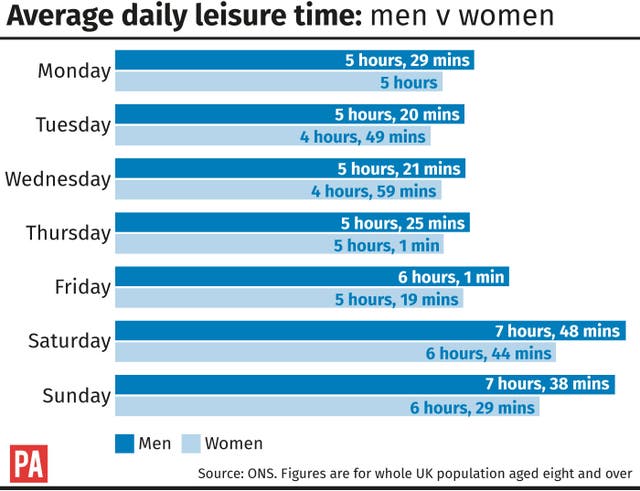Men in the UK enjoy almost five more hours of leisure time a week than women, according to official analysis.
The figures also suggest the gap between how long each sex spends on recreation, hobbies and socialising has widened since the turn of the century.
A report from the Office for National Statistics (ONS) said that in 2015 men took, on average, 43 hours of leisure time per week – compared with around 38 hours for women.
Do men or women take more leisure time? Discover differences by gender and age in our new Visual.ONS post https://t.co/3LKI7ZQ4MR pic.twitter.com/df2kdKpIDi
— ONS (@ONS) January 9, 2018
Leisure time includes socialising, resting and taking time out, cultural, sports or outdoor pursuits, hobbies, computing and games, consuming mass media, eating out and travel associated with these activities.
It excludes paid work, chores, childcare, study and travel unrelated to leisure activities, as well as eating and sleeping.
It continued: “Leisure time for women could be less than for men because although women are more frequently engaged in part-time work than men, they spend more time completing unpaid work such as household chores and childcare. The hours spent on unpaid work are likely to replace those hours that could have been spent on leisure activities.”
People living in households with a child under the age of 15 report that they take up to 14 hours per week less leisure time than those living on their own.
Men consistently took more leisure time than women regardless of how old the child in their household was, the report noted.

The findings point to variations across the age groups.
In 2015, people aged 25 to 34 took the least amount of leisure time.
“This could be due to people in this age group having young children,” the ONS said.
Leisure hours per week increase quickly as people get older, with those aged 65 and over taking the most.
Sixteen to 24-year-olds took a high amount of leisure time per week, according to the analysis. It said: “This might be due to this age group including students.”






